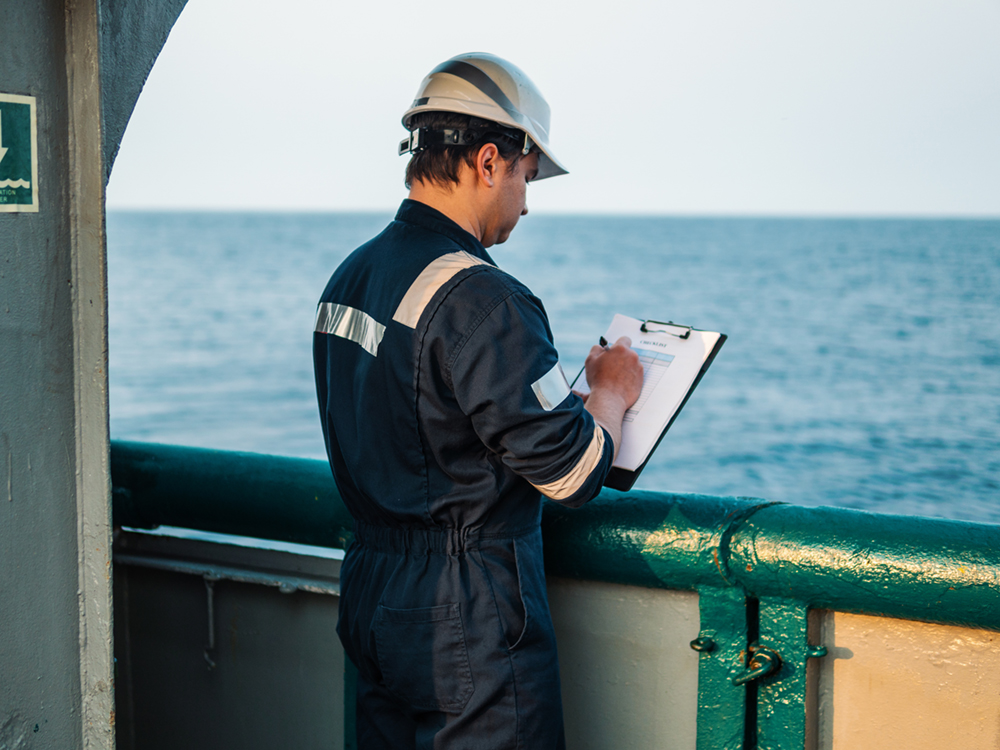A Maritime Just Transition Task Force collaborative project is setting the framework to equip seafarers with skills as shipping transitions to zero emissions. The project is set to develop a training framework to equip seafarers with skills as shipping transitions to zero greenhouse gas emissions.
The Project will work to prepare seafarers for zero or near-zero emissions ships, helping the global shipping industry to decarbonize and ensuring a just transition for seafarers.
The aim is to equip seafarers with skills and provide guidance for trainers and the industry.
The Project will be co-funded by IMO through its technical cooperation funding, including the IMO GHG TC Trust Fund; and by the Lloyd's Register Foundation. The project is a collaborative project with the Maritime Just Transition Task Force.
Seafarers are at the core of the shipping industry. This training is vital to ensure a successful transition to a new shipping landscape emanating from overall climate action and the implementation of the 2023 IMO Strategy on Reduction of GHG Emissions from Ships.
The project will be run by IMO and the Maritime Just Transition Task Force Secretariat. Lloyd's Register will develop the training framework for seafarers and officers, as well as an instructor handbook for maritime training institutions. The World Maritime University (WMU), an IMO global research, education and training institute based in Malmö, Sweden, will provide academic expertise. A large number of organisations are involved through a global industry peer learning group, which will provide important knowledge-sharing.
Once developed, the Baseline Training Framework for Seafarers in Decarbonization will be first tested out in Asia through a programme led by WMU, with support from the IMO-established Maritime Technology Cooperation Centre (MTCC) Asia and other partners. The aim is to then make the packages available globally to all the established MTCCs and other appropriate organizations. The packages will also be available to IMO Member States, for potential use by maritime education and training (MET) institutes to develop their programmes, as appropriate. A 'train the trainer' programme will also be developed to assist METs further. The timeline is to develop the training materials by mid-2025.
The Project is being announced as the 2023 UN Climate Change Conference (COP 28) meets in Dubai, United Arab Emirates, from 30 November to 12 December 2023. IMO is at COP 28 and is involved in a number of events. (Read more here: IMO at COP 28). The Maritime Just Transition Task Force was formed at COP 26 in 2021 by the International Chamber of Shipping (ICS), the International Transport Workers' Federation (ITF), the United Nations Global Compact, ILO and IMO. Read more here.
The genesis of this initiative goes back to a project initiated by IMO in the Philippines in 2021 to improve the safety and energy efficiency of its domestic ferry fleet. The need to train seafarers was identified as one of the follow up actions. IMO developed a thematic project to assist the Maritime Education and Training (MET) Institutions in Asia, particularly in seafarer-supplying countries, to develop specific training on energy efficiency for seafarers. The aim would be to to assist all the MET Institutions around the globe.
The Maritime Just Transition Task Force has identified that up to 800,000 seafarers may require additional training by the mid-2030s to handle zero carbon fuels. (Read the Seafarer training and skills for decarbonized shipping report).
The IMO Secretariat invited the Maritime Just Transition Task Force to join in IMO's project to develop a Baseline Training Framework for Seafarers in Decarbonization, recognizing the benefits of joining efforts.
The Maritime Just Transition Task Force was formed at COP 26 in 2021 by the International Chamber of Shipping (ICS), the International Transport Workers' Federation (ITF), the United Nations Global Compact, IMO and the International Labour Organization (ILO). Primarily supported by funding from Lloyd's Register Foundation, the taskforce has worked to ensure seafarers are put at the heart of shipping's response to the climate emergency.
